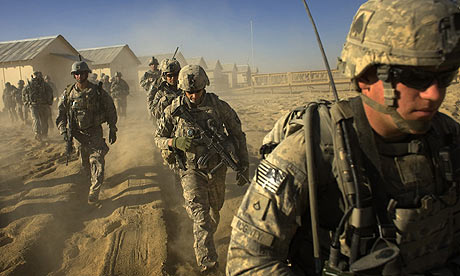American Death Toll In Afghanistan Surpasses 1,000
 Earlier this week, the Afghan War, already the longest conflict in American history, reached another grim milestone:
Earlier this week, the Afghan War, already the longest conflict in American history, reached another grim milestone:
On Tuesday, the toll of American dead in Afghanistan passed 1,000, after a suicide bomb in Kabul killed at least five United States service members. Having taken nearly seven years to reach the first 500 dead, the war killed the second 500 in fewer than two. A resurgent Taliban active in almost every province, a weak central government incapable of protecting its people and a larger number of American troops in harm’s way all contributed to the accelerating pace of death.
For a war that will reach it’s ninth year in October, this is actually a relatively low death toll, but that’s due largely to the nature of the military operations there and the fact that, until recently, American forces have seemingly refrained from engaging the Taliban insurgency directly. The distressing thing, of course, is that the death toll has increased each year since we’ve been there, and seems poised to do so again in 2010.
It’s a war with no end in sight, and, despite the recent moves by General McChrystal, with seemingly no clear strategy either. At some point, I think, someone has to start asking what we’re still doing there.
Maybe, depending how you define conflict, or there was the American occupation of the Phillipines from roughly 1899 – 1913 (the official fighting was over in about three years, but holdout groups kept fighting for 10 more.)
I bring it up because it did not end particularly well and is largely forgotten and because of the possible parallels between it and Afghanistan.
It would have been interesting to have just one war and the country secured and all our resources fighting Al Qaeda in Afghanistan and Pakistan. Too bad Bush screwed up the war by not having 500,000 troops and the wars paid for. Too many people died over politics and mistakes.
The role of the United States in the Vietnam War began soon after the Second World War and escalated into full commitment during the Vietnam War (1959—1975).
I would think Vietnam as a “conflict” would be counted from ’61 (first Special Forces sent in, though CIA had been there for years) to ’73 when we essentually turned the war over to the South Vietnamese – but that is certainly a measurement subject to a lot of interpretation, so I will give it to you.
Doug, did you support the initial invasion of Afghanistan? Why?
I opposed it largely because I thought the situation we’re in now was a foreseeable outcome of the invasion. Any achievable goal in our national interests could be achieved with air power.
500,000 troops in Afghanistan? It is to laugh. The logistics are impossible. Not just difficult but impossible. We’re probably nearing the logistical limit now.
It seems to me that if you thought it was in our national interest to invade (I didn’t), in our national interest to remain in 2005, then you think that it is in our national interest to stay. I’m not being sarcastic. I genuinely don’t understand and am looking for explanation.
Our initial intent was to go after the people who attacked us. And that was Al Qaeda and they were using Afghanistan as their home base. Bush senior had 500,000 coalition troops and won the gulf war. You win with numbers and you secure the areas. And Bush senior had the other countries pay for the gulf war. None of this was done under Bush 43. We had a max of 170,000 troops for both Afghanistan and Iraq. It is obvious we did not have enough troops and the borders secure. We had a quagmire in Iraq. We are lucky to be where we are with so much incompetence and the abandonment of Afghanistan for over 5 years.
Afghanistan is a void and will need to be occupied for some time.
With air power, isn’t that what we are doing with drones in Afghanistan and Pakistan? And we can’t fly our aircraft over Pakistan. Maybe at the time we were chasing Osama Bin Laden at Tora Bora, but at the time, the CIA agent in charge, did not get much help. And air power does not solve the economic and political situation and the void that exists today in Afghanistan.
Meaning no one has asked it yet? Or that no one wants to make things difficult for President Obama by examining results rather than intentions?